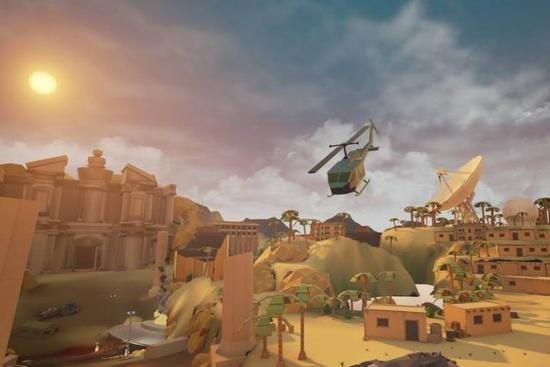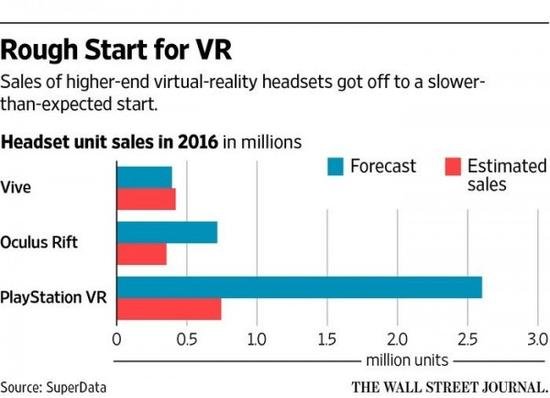According to the Wall Street Journal online edition, although the prospects of the VR market are bright and generally favored by industry companies, in the short-term, high-end headsets such as the Sony PS VR and Oculus Rift are expensive and popular. On the other hand, developers cannot make money on games and have begun to revisit their VR strategy. Some VR startups underestimated the challenges and eventually closed down. In order to solve this problem, Facebook and other companies are also stepping up VR publicity efforts to demonstrate VR experiences in more public places, and funding developers to bundle games and equipment for sales and increase developer revenue.
The following is the full text of the article:
When game developer Rocket Werkz released one of the first virtual reality (VR) games last spring, developers at New Zealand studios hope that the game will break even, and may even be profitable.
Developers cannot make money
However, these two hopes have been lost. Dean Hall of RocketWerkzCEO said that the price of the strategic game "Out of Ammo" is $20, and the company's development cost for this game is about $650,000. Only about 60% was recovered. Now RocketWerkz has redeveloped traditional PC games.

VR game "Let's make food"
Supporters of VR technology have vowed that VR will be the next big step in computing. However, despite the fact that VR devices relying on smart machines are sold, the more expensive VR headsets that connect high-performance PCs or game consoles do not meet expectations.
This prompted some developers to start revisiting VR. "The future of VR is very bright, but in the short term, this is not an industry that suits us," Hall said. "For us, the return on investment is not enough."
The venture company VoyagerCapital invested $100,000 in VR software developer Envelop VR in 2015. The latter's software enables users to interact with traditional desktop applications in a VR environment. Voyager partner Erik Benson said that EnvelopVR had closed in January despite having raised more than $5 million in funds.
Benson said that start-up companies want to safely survive the early stage of the VR industry, but the actual challenges may be greater than they expected.
Envelop VR CEO declined to comment.
High-end equipment sales lower than expected
Market research firm IDC estimates that high-end headsets such as the Sony PS VR, Oculus Rift and HTC Vive had sales of 2.2 million units last year and sales of about US$1.4 billion, which was lower than IDC’s previous forecast. IDC lowered its high-end VR device sales forecast for 2017 to 6.4 million units, with sales of US$3.2 billion.
The actual sales of high-end VR devices are even lower than those of other research companies. SuperDataResearch originally estimated that the sales of high-end VR devices last year was 3.7 million, but in the end it was only 1.4 million. SuperData said that Sony PS VR sales last year, about 745,000. Facebook sold about 243,000 Rifts and HTC sold about 420,000 Vives.

High-end VR headsets sold less than expected
“VR manufacturers and developers have invested all their enthusiasm, but the consumer market has not given the same degree of response,†said Shauna Heller, founder of consultancy Clay Park VR. Heller was a developer relationship expert at Facebook's Oculus VR.
Supporters of VR technology believe that VR will succeed. Japanese game developer Capcom said that nearly 10% of Resident Evil 7 players on PS4 will also play VR.
Increase VR promotion
One obstacle to the popularity of VR devices is that casual players cannot experience the special appeal of VR simply by watching advertisements or watching other people wear headsets. “This is an experience that interacts with a hardware product,†said Eric Lempel, Sony’s PlayStation marketing director. “You have to wear a headset to experience it.â€
Headset equipment manufacturers also organize events to demonstrate VR experiences in more public places, such as supermarkets, university campuses, and festivals. They are also working hard to make VR devices more user-friendly, such as developing higher-end headsets that do not require a PC.
At the same time, Facebook and HTC invested hundreds of millions of dollars in assisting developers. They bundled some games with headsets and sold them. This helped some developers get a good start, such as Owlchemy Labs, a Texas developer.
Owlchemy's VR game "JobSimulator" is temporarily sold with HTC Vive. Owlchemy CEO Alex Schwartz said that the "Work Simulator" is now profitable, with revenues exceeding $3 million, mostly from players who spend about $30 to download a copy of the game.
For other software companies, attracting a large number of users has always been a challenge. For example, RocketWerkz did not receive financial assistance and its games were not sold with VR devices.
The Seattle startup PerilousOrbit and its UK partner CherryPop Games have already achieved some success in the SportsBar VR game. This $20 game allows users to cast darts and play other indoor games. Richard Kidd, Perilous CEO, said that the game has been profitable, but sales have fallen sharply since going live.
"The market's growth is slower than we expected," he said. "We can't push the company's growth as much as we want."
Head-mounted device manufacturers also admit that developers may take longer to get a return on VR games. “This is tuition,†said Jason Rubin, Facebook’s Oculus content director.
Smart Body Fat Scales,Bluetooth Smart Body Fat Scale,Bluetooth Digital Bmi Scales,Scales For Body Weight
C&Q Technology (Guangzhou) Co.,Ltd. , https://www.gzcqteq.com
